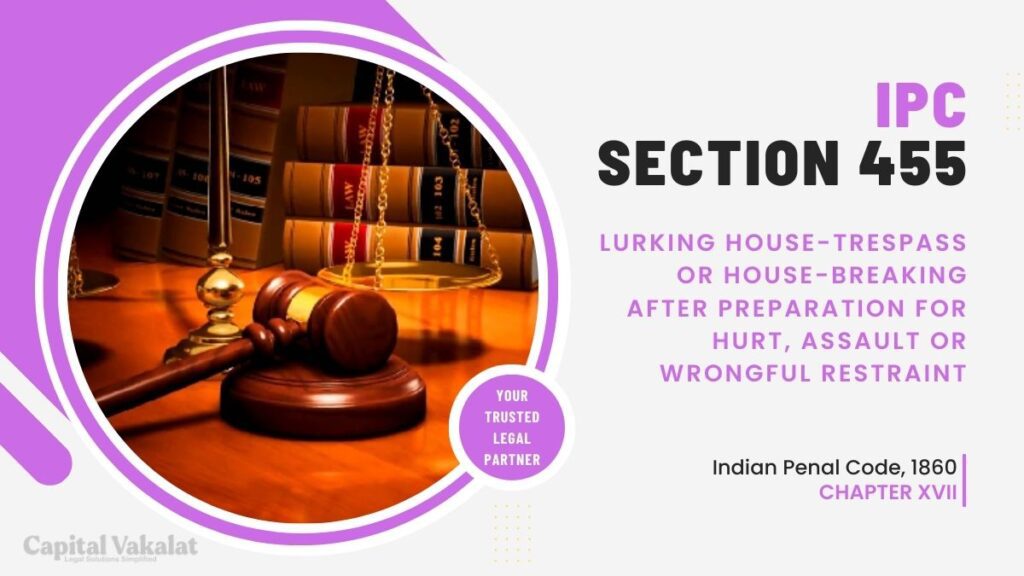The legal landscape is vast and complex, with various sections and provisions designed to safeguard the rights and security of individuals. One such provision, Section 455 of the Indian Penal Code (IPC), addresses the grave offenses of lurking house-trespass or house-breaking after preparation for hurt, assault, or wrongful restraint. In this article, we will delve into the intricacies of Section 455 IPC, exploring its components, implications, and the broader context of home security.

Understanding Section 455 IPC is crucial in the realm of criminal law. This provision deals specifically with situations where individuals engage in house-trespass or house-breaking with the intent of causing harm, assault, or wrongful restraint. It acts as a deterrent against acts that go beyond mere intrusion, aiming to protect the sanctity and security of one’s home.
Understanding Section 455 IPC
Section 455 IPC provides a legal framework for dealing with cases where house-trespass or house-breaking is committed after preparation to cause hurt, assault, or wrongful restraint. It distinguishes itself from other provisions by explicitly addressing the premeditated nature of the offense.
Lurking House-Trespass
Lurking house-trespass involves entering a property surreptitiously with the intent of committing an offense. The section requires a careful analysis of the circumstances surrounding the trespass, emphasizing the covert nature of the act. Instances of lurking house-trespass could range from unauthorized entry with malicious intent to spy on residents or commit theft.
House-Breaking After Preparation
House-breaking after preparation, as outlined in Section 455 IPC, encapsulates offenses where individuals not only trespass into a property but also prepare for actions that may lead to hurt, assault, or wrongful restraint. This involves a higher degree of premeditation, elevating the severity of the offense.
Intent for Hurt, Assault, or Wrongful Restraint
The distinctive feature of Section 455 IPC is the inclusion of intent for hurt, assault, or wrongful restraint. This element adds gravity to the offense, recognizing the potential harm that can result from planned trespass or break-ins. Legal consequences for such intent are stringent, reflecting the severity of the threat posed by the offender.
Preventive Measures for House-Owners
As individuals, there are proactive steps one can take to enhance home security and minimize the risk of falling victim to lurking house-trespass or house-breaking. Implementing robust security systems, securing entry points, and staying informed about local security concerns are essential measures to safeguard one’s home.
Legal Precedents
Examining past legal cases involving Section 455 IPC provides insights into how the provision has been applied in various situations. Case studies serve as practical examples, shedding light on the nuances of the law and the outcomes of legal proceedings.
Challenges in Enforcing Section 455 IPC
Despite the legal provisions in place, law enforcement faces challenges in effectively enforcing Section 455 IPC. Issues such as delayed reporting, lack of evidence, and difficulties in identifying perpetrators can impede the pursuit of justice. Exploring potential reforms to address these challenges is crucial for enhancing the efficacy of the legal system.
Public Awareness and Education
Creating awareness about Section 455 IPC within communities is pivotal for preventing offenses related to house-trespass and house-breaking. Educating the public about the legal consequences of such actions and fostering a sense of collective responsibility can contribute to a safer living environment.
Conclusion
In conclusion, Section 455 IPC plays a crucial role in protecting individuals from lurking house-trespass and house-breaking after preparation for hurt, assault, or wrongful restraint. By understanding the nuances of this legal provision, individuals can actively contribute to their own safety and the security of their communities. Vigilance, awareness, and collaboration between law enforcement and the public are essential in upholding the principles of justice outlined in Section 455 IPC.
Frequently Asked Questions
What legal consequences can individuals face for violating Section 455 IPC?
Offenders can face severe legal consequences, including imprisonment, fines, and a criminal record, depending on the nature and severity of the offense.
How can homeowners enhance their security to prevent house-trespass and break-ins?
Implementing security systems, securing entry points, and staying informed about local security concerns are effective measures for homeowners.
Are there any recent legal developments or amendments related to Section 455 IPC?
It’s essential to stay updated on legal developments, but as of my knowledge cutoff in January 2022, no specific recent amendments to Section 455 IPC were recorded.
What role does public awareness play in preventing offenses under Section 455 IPC?
Public awareness is crucial in preventing offenses by fostering a sense of responsibility and encouraging communities to be vigilant and report suspicious activities.